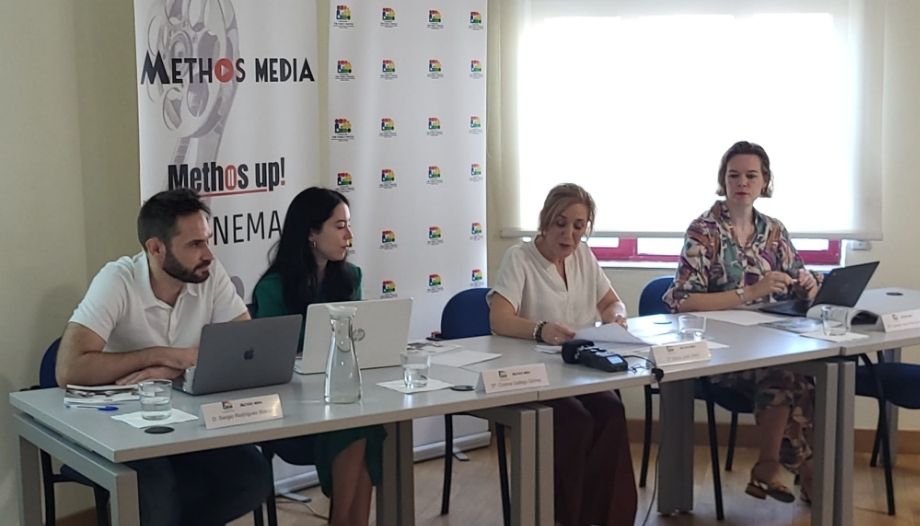The Foundation The Family Watch'.in collaboration with Methos Mediahas presented the fifth edition of the report on movies and series in Spain, entitled "Grandparents and the elderly in the most watched movies and series in Spain in 2024".
The text proposes the evolution towards a "more realistic and enriching image of old age, challenging prejudices" and without ageism, that is, without discrimination or prejudice based on age.
In 2030, Spain will have a life expectancy of 83.1 years and 30 % of the population will be over 60 years of age, the so-called silver generation, although this concept sometimes includes people from the age of 55.
For this reason, Family Watch (TFW) and researchers from the universities Antonio de Nebrija, Rey Juan Carlos and Europea de Madrid, have prepared a comprehensive report, in which they analyze a total of 129 film and series characters, with the "narrative role, gender, social class, diversity, the presence of stereotypes, the treatment of welfare and ageism".
Seniors over 65 watch an average of 7 hours of TV per day
The objective of the research has been to systematically understand what kind of older characters appear in these contents and how they could influence the social perception of old age.
For context, the authors cite various sources that provide the following data, among others:
- television leads the way in senior entertainment. It is watched daily by 80 percent of those over 60, compared to only 29 percent of young people.
- those over 65 years of age are the ones who spend the most time watching television: 7 hours a day on average (Barlovento Comunicación, 2024).
- Regarding Internet use, the elderly use the network to: read news (54.3 %); contract with public administrations (48.7 %); make video calls (48.1 %).
Stereotypes persist
The researchers of the report, Carmen Llovet (BELSILVER Nebrija-L'Oréal Groupe Chair), Sergio Rodriguez Blanco (same Chair), Cristina Gallego-Gómez (Rey Juan Carlos), and Gema López-Sánchez (U. European University), conclude that "although the audiovisual content analyzed in 2024 reflects the growing demographic weight and purchasing power of the Spanish senior population, as well as, in part, their active role and family support, it also shows that there is an under-representative number of seniors and that stereotypes associated with this age group persist".
This is particularly marked, they add, "in the representation of older women - there is a higher proportion of women at older ages - and in the omission of realities such as dependency or unwanted loneliness, despite this being a prevalent problem in southern Europe".
Breakdown of main findings
These are the most important conclusions:
1) In the analysis of 129 characters in 40 audiovisual products, Spain leads the most watched production by over-60s in 2024, with 53.8 % in both series and movies, followed by the US (30.8 %).
2) Older people are clear about their main themes: the drama genre (32.2 %), followed by comedy (18.4 %) and romantic comedy (10.5 %).
3) The family situation of the elderly is not identified in 38.8 % of the series, which is associated with autonomous profiles that are not dependent on their family members, but are also not their providers.
4) People over 60 belong mostly to an upper-middle stratum in 69.8 % of the cases, coinciding with the silver generation trend, who have stability and can support their families.
5) In 11.5 % of the cases, the characters are engaged in SMEs or large businesses and in the same proportion in security and defense forces.
Ageism
The report points out that "the path towards a full representation without ageism still presents significant challenges, so recommendations are made on the diversity of the experience of older adults in Spain in audiovisual content".
It is necessary that cinema and television, as "cultural mirrors," they add, "evolve to offer a more inclusive, realistic and enriching image of the world. old agechallenging prejudices and normalizing the heterogeneity of this vital stage".
Intergenerational linkages, active aging
For example, "creators are encouraged to portray the intergenerational links that help the exchange of values and knowledge, promote representations where their family situation in this time of change and welfare as a result of their social contribution is made visible".
According to María José Olesti, general director of The Family Watch Foundation, "the main objective of this report is to analyze the demographic, socioeconomic and social reality of older adults in Spain, and how this "silver generation" is represented in the audiovisual media and in fiction.
From TFW We also wanted to give visibility to "positive longevity" and "active aging", which are realities that already exist in all countries of the world.
And also "to promote the fact that this is a stage where learning continues and where many activities continue to be developed with a very positive impact on both physical and emotional health. And for this it is essential to count on the family and especially with young people".
Rankings and some characters
The study includes a lot of information about movies and TV series in Spain. For example, the ranking of series premiered in 2024. In the ranking, 'Zorro', the most watched premiere series in 2024, on La1, is at the top of the list. It is followed by 'Entre tierras' and the telenovela 'Sueños de libertad', both on Antena 3. And in fourth place, 'Las abogadas', also on La1.
As for some characters, comedy, in particular, is a space in which "ageism is normalized under the excuse of white or family humor. Felipe, in 'A todo tren: destino Asturias', acts irresponsibly and causes an accident with family consequences. In 'Padre no hay más que uno' (4), the elderly appear as a burden for their children. Added to this is the stereotype of the 'dirty old man', which persists in characters such as Pedro and Lucas ('Vaya par de gemelos'), or the aforementioned Felipe, whose sexuality becomes the butt of the joke".








